第八讲-词序调整法 PPT
词序调整
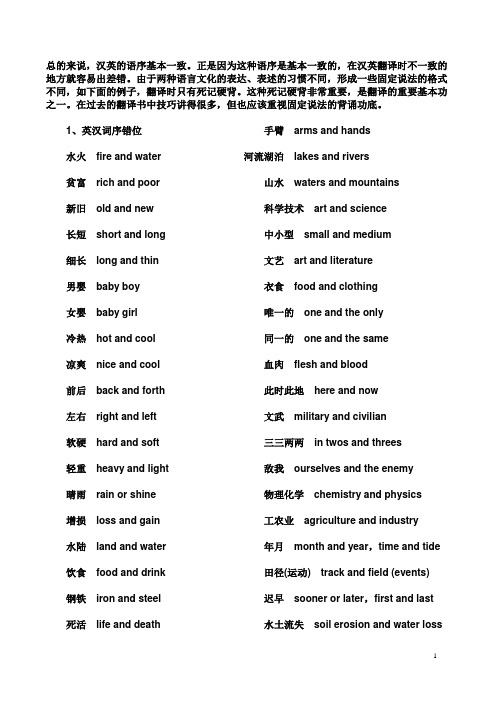
总的来说,汉英的语序基本一致。
正是因为这种语序是基本一致的,在汉英翻译时不一致的地方就容易出差错。
由于两种语言文化的表达、表述的习惯不同,形成一些固定说法的格式不同,如下面的例子,翻译时只有死记硬背。
这种死记硬背非常重要,是翻译的重要基本功之一。
在过去的翻译书中技巧讲得很多,但也应该重视固定说法的背诵功底。
1、英汉词序错位水火fire and water 贫富rich and poor 新旧old and new长短short and long 细长long and thin 男婴baby boy女婴baby girl冷热hot and cool凉爽nice and cool 前后back and forth 左右right and left软硬hard and soft 轻重heavy and light 晴雨rain or shine增损loss and gain 水陆land and water 饮食food and drink 钢铁iron and steel 死活life and death手臂arms and hands河流湖泊lakes and rivers山水waters and mountains科学技术art and science中小型small and medium文艺art and literature衣食food and clothing唯一的one and the only同一的one and the same血肉flesh and blood此时此地here and now文武military and civilian三三两两in twos and threes敌我ourselves and the enemy物理化学chemistry and physics工农业agriculture and industry年月month and year,time and tide田径(运动)track and field (events)迟早sooner or later,first and last水土流失soil erosion and water loss新郎新娘the bride and the bridegroom手疾眼快quick of eye and deft of hand喜怒哀乐anger, grief, joy and happiness水乳交融as well blended as milk and water2、有一些情况汉英说法顺序差不多如:上下up and down高低high and low老幼old and young父母father and mother夫妇man and wife黑白black and white(生活)沉浮ups and downs彻头彻尾from head to foot来龙去脉from beginning to end来来往往come and go, back and forth 3、汉语习语中常有同义重复表达。
翻译技巧--词序调整法PPT

2
He wanted to get someone reliable to help with the work. 他想找一个可靠的人帮忙做这项工作。
Everybody present was deeply moved. 在场的每个人深受感动。
He was one of the earliest English grammarians who paid attention to this problem. 他是最早注意到这一问题的英语语法学家之一。
Better take your umbrella in case it rains.
最好带上伞以防下雨。
13
翻译练习
1. the sum total
总额
2. an unheard-of thing
闻所未闻的事
3. I do it because I like it.
因为我喜欢我才做。
4. I’ll let you know as soon as it is arranged.
elementary and secondary schools heal the wounded and rescue the dying food, clothing, shelter and transportation
中小学 救死扶伤 衣食住行
11
翻译技巧:句序调整法
1. 时间顺序
英语复合句中,表示时间的从句可以放在主句之前,也可以放在主句之后, 汉语中则通常先叙述先发生的事,后叙述后发生的事。
She is not quite fit for this kind of work, if I may say so. 如果我可以这样说的话,她做这工作不怎么太合适。
调整语序法(讲义)
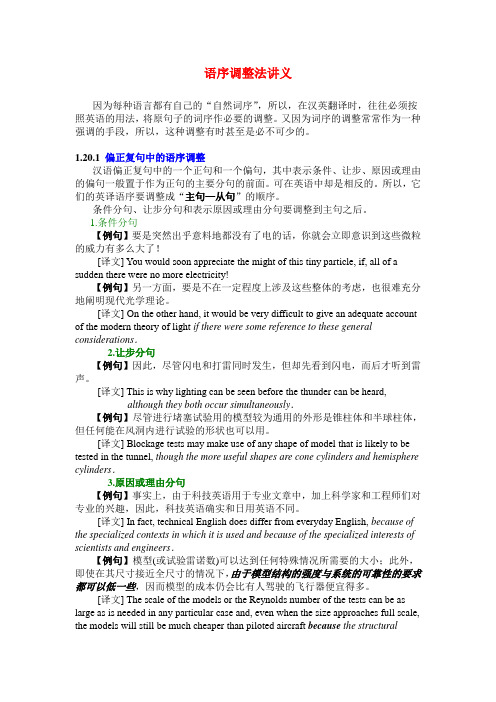
语序调整法讲义因为每种语言都有自己的“自然词序”,所以,在汉英翻译时,往往必须按照英语的用法,将原句子的词序作必要的调整。
又因为词序的调整常常作为一种强调的手段,所以,这种调整有时甚至是必不可少的。
1.20.1 偏正复句中的语序调整汉语偏正复句中的一个正句和一个偏句,其中表示条件、让步、原因或理由的偏句一般置于作为正句的主要分句的前面。
可在英语中却是相反的。
所以,它们的英译语序要调整成“主句—从句”的顺序。
条件分句、让步分句和表示原因或理由分句要调整到主句之后。
1.条件分句【例句】要是突然出乎意料地都没有了电的话,你就会立即意识到这些微粒的威力有多么大了![译文] You would soon appreciate the might of this tiny particle, if, all of a sudden there were no more electricity!【例句】另一方面,要是不在一定程度上涉及这些整体的考虑,也很难充分地阐明现代光学理论。
[译文] On the other hand, it would be very difficult to give an adequate account of the modern theory of light if there were some reference to these general considerations.2.让步分句【例句】因此,尽管闪电和打雷同时发生,但却先看到闪电,而后才听到雷声。
[译文] This is why lighting can be seen before the thunder can be heard, although they both occur simultaneously.【例句】尽管进行堵塞试验用的模型较为通用的外形是锥柱体和半球柱体,但任何能在风洞内进行试验的形状也可以用。
翻译技巧之词序调整法
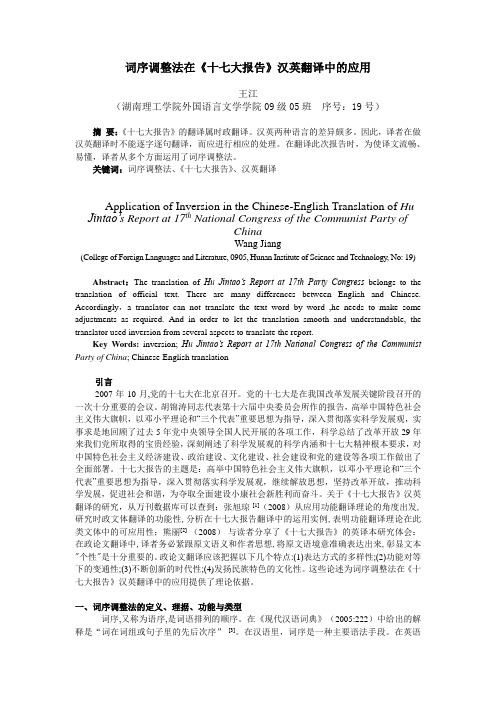
词序调整法在《十七大报告》汉英翻译中的应用王江(湖南理工学院外国语言文学学院09级05班序号:19号)摘要:《十七大报告》的翻译属时政翻译。
汉英两种语言的差异颇多。
因此,译者在做汉英翻译时不能逐字逐句翻译,而应进行相应的处理。
在翻译此次报告时,为使译文流畅、易懂,译者从多个方面运用了词序调整法。
关键词:词序调整法、《十七大报告》、汉英翻译Application of Inversion in the Chinese-English Translation of Hu Jintao’s Report at 17th National Congress of the Communist Party ofChinaWang Jiang(College of Foreign Languages and Literature, 0905, Hunan Institute of Science and Technology, No: 19) Abstract:The translation of Hu Jintao’s Report at 17th Party Congress belongs to the translation of official text. There are many differences between English and Chinese. Accordingly,a translator can not translate the text word by word ,he needs to make some adjustments as required. And in order to let the translation smooth and understandable, the translator used inversion from several aspects to translate the report.Key Words:inversion; Hu Jintao’s Report at 17th National Congress of the Communist Party of China; Chinese-English translation引言2007年10月,党的十七大在北京召开。
调整词序的方法
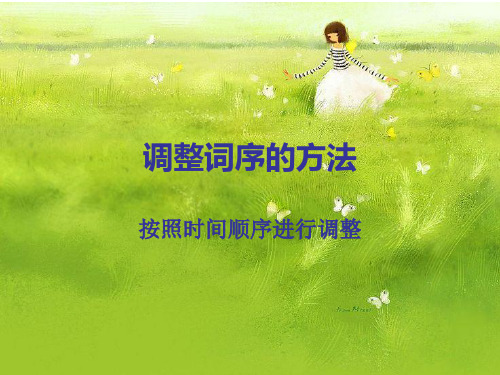
按照时间顺序进行调整
一、顺译
• 1、多个表示连贯动作的动词并列时,英语 和汉语往往都可以按照动作发生的先后顺 序来安排词序。因此,英汉互译时通常可 以采用顺译法 • 例句:
• (1)He
would drive a rental truck loaded with his belongings and I would follow him in his sedan, • then fly back. • 到时他将开租来的卡车拉上全部家什,我跟在后 面帮他把小车开过去,然后乘飞机返回。
3、英语中有些介词短语、副词短语、分词短或 “介词+动名词”结构置于句首 表示时间,翻译 时可采用顺译。
例句 Pulling one of the leafy branches downward, I hang the bucket on it with the hook. 我拉下一根多页的树枝,用钩子把桶挂在上面。 On arriving at the spot, he found that the gypsies had gone. (Wilde) 他赶到那里时发现那些吉卜赛人已经走了。
例如: I shall answer his letter as soon as I have a moment to spare. 我一有空就会给他回信。 Turn off the light when you leave the classroom. 离开教室时请把灯关掉。
(语境的需要) The poor ballet dancer must devote years of incessant toil to her profitless task before she can shine in it. 译文一:可怜的芭蕾舞演员在芭蕾舞上大放异彩之前,必须长年 累月地将自己 的辛勤劳动奉献给无益的苦差事。 译文二:可怜的芭蕾舞演员必须长年累月地将自己的辛勤劳动奉 献给无益的苦 差事,之后才能在芭蕾舞上大放异彩。
《古代汉语的词序》课件

形容词的词序
总结词
形容词在句子中的位置通常位于名词之前或之后,根 据具体语境而定。
详细描述
在古代汉语中,形容词用于描述名词的属性或特征, 因此形容词在句子中的位置通常是在名词之前或之后 ,具体取决于语境和表达的需要。例如,“高楼”中 ,“高”是形容词,“楼”是名词,形容词“高”位 于名词“楼”之前,描述了楼的高度属性。又如“楼 高”中,“高”是形容词,“楼”是名词,形容词“ 高”位于名词“楼”之后,强调了楼的高度特征。
词序的分类
• 词序的分类:根据词语在句子中的位置和顺序,可以将词序分为多种类型,如主语-谓语-宾语顺序、定语-中心词顺序、状 语-中心词顺序等。
词序的重要性
• 词序的重要性:在古代汉语中,词序是表达语义和语用功能 的关键因素之一。不同的词序可以表达不同的语义和语用功 能,对于理解古代汉语的语义和语用意义具有重要意义。同 时,正确的词序也有助于提高语言表达的准确性和清晰度。
语言发展的需要
随着语言的发展,一些新 的词汇和表达方式出现, 需要调整原有的词序来适 应新的表达需求。
文化交流的影响
古代中国与周边国家的文 化交流,也促进了词序的 演变。
词序演变的过程
先秦时期
古代汉语的词序比较自由,先秦 时期已经开始出现一些固定的词
序。
汉魏六朝时期
汉魏六朝时期是古代汉语词序演 变的加速期,随着佛教的传入和 文化的交流,出现了一些新的词 汇和表达方式,词序也发生了较
动词的词序
总结词
动词在句子中的位置通常位于名词之后,形容词之前。
详细描述
在古代汉语中,动词是句子的核心成分之一,通常放在句子的中心位置。动词在句子中的位置通常是 在名词之后,形容词之前。例如,“食马”中,“食”是动词,“马”是名词,“之”是形容词,动 词“食”位于名词“马”之后,形容词“之”之前。
词序调整法
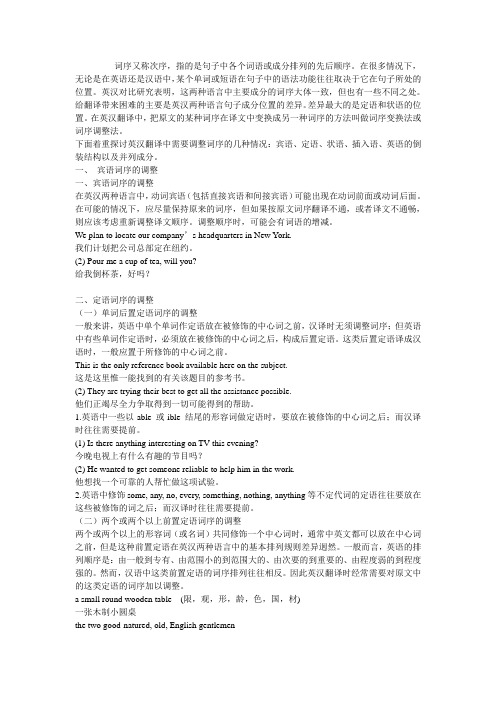
词序又称次序,指的是句子中各个词语或成分排列的先后顺序。
在很多情况下,无论是在英语还是汉语中,某个单词或短语在句子中的语法功能往往取决于它在句子所处的位置。
英汉对比研究表明,这两种语言中主要成分的词序大体一致,但也有一些不同之处。
给翻译带来困难的主要是英汉两种语言句子成分位置的差异。
差异最大的是定语和状语的位置。
在英汉翻译中,把原文的某种词序在译文中变换成另一种词序的方法叫做词序变换法或词序调整法。
下面着重探讨英汉翻译中需要调整词序的几种情况:宾语、定语、状语、插入语、英语的倒装结构以及并列成分。
一、宾语词序的调整一、宾语词序的调整在英汉两种语言中,动词宾语(包括直接宾语和间接宾语)可能出现在动词前面或动词后面。
在可能的情况下,应尽量保持原来的词序,但如果按原文词序翻译不通,或者译文不通畅,则应该考虑重新调整译文顺序。
调整顺序时,可能会有词语的增减。
We plan to locate our company’s headquarters in New Y ork.我们计划把公司总部定在纽约。
(2) Pour me a cup of tea, will you?给我倒杯茶,好吗?二、定语词序的调整(一)单词后置定语词序的调整一般来讲,英语中单个单词作定语放在被修饰的中心词之前,汉译时无须调整词序;但英语中有些单词作定语时,必须放在被修饰的中心词之后,构成后置定语。
这类后置定语译成汉语时,一般应置于所修饰的中心词之前。
This is the only reference book available here on the subject.这是这里惟一能找到的有关该题目的参考书。
(2) They are trying their best to get all the assistance possible.他们正竭尽全力争取得到一切可能得到的帮助。
1.英语中一些以-able或-ible结尾的形容词做定语时,要放在被修饰的中心词之后;而汉译时往往需要提前。
10词序调整法
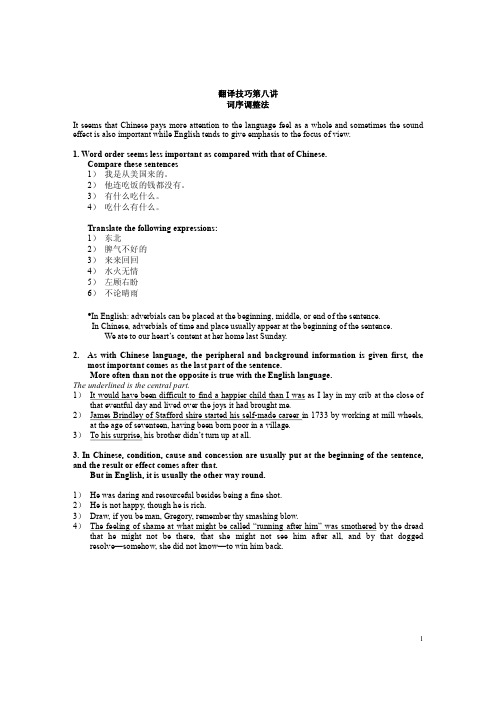
翻译技巧第八讲词序调整法It seems that Chinese pays more attention to the language feel as a whole and sometimes the sound effect is also important while English tends to give emphasis to the focus of view.1.Word order seems less important as compared with that of Chinese.Compare these sentences1) 我是从美国来的。
2) 他连吃饭的钱都没有。
3) 有什么吃什么。
4) 吃什么有什么。
Translate the following expressions:1) 东北2) 脾气不好的3) 来来回回4) 水火无情5) 左顾右盼6) 不论晴雨•In English: adverbials can be placed at the beginning, middle, or end of the sentence.In Chinese, adverbials of time and place usually appear at the beginning of the sentence.We ate to our heart’s content at her home last Sunday.2. As with Chinese language, the peripheral and background information is given first, themost important comes as the last part of the sentence.More often than not the opposite is true with the English language.The underlined is the central part.1) It would have been difficult to find a happier child than I was as I lay in my crib at the close of that eventful day and lived over the joys it had brought me.2) James Brindley of Stafford shire started his selfmade career in 1733 by working at mill wheels, at the age of seventeen, having been born poor in a village.3) To his surprise,his brother didn’t turn up at all.3. In Chinese, condition, cause and concession are usually put at the beginning of the sentence, and the result or effect comes after that.But in English, it is usually the other way round.1) He was daring and resourceful besides being a fine shot.2) He is not happy, though he is rich.3) Draw, if you be man, Gregory, remember thy smashing blow.4) The feeling of shame at what might be called “running after him” was smothered by the dread that he might not be there, that she might not see him after all, and by that dogged resolve—somehow, she did not know—to win him back.1。
词序调整法Inversion
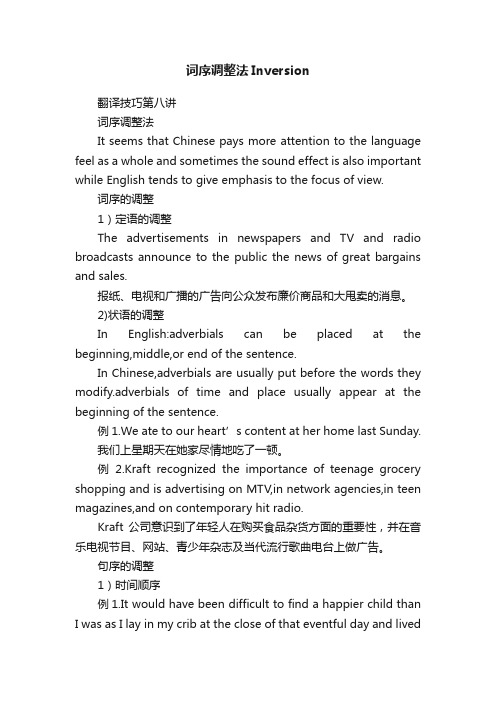
词序调整法Inversion翻译技巧第八讲词序调整法It seems that Chinese pays more attention to the language feel as a whole and sometimes the sound effect is also important while English tends to give emphasis to the focus of view.词序的调整1)定语的调整The advertisements in newspapers and TV and radio broadcasts announce to the public the news of great bargains and sales.报纸、电视和广播的广告向公众发布廉价商品和大甩卖的消息。
2)状语的调整In English:adverbials can be placed at the beginning,middle,or end of the sentence.In Chinese,adverbials are usually put before the words they modify.adverbials of time and place usually appear at the beginning of the sentence.例1.We ate to our heart’s content at her home last Sunday.我们上星期天在她家尽情地吃了一顿。
例2.Kraft recognized the importance of teenage grocery shopping and is advertising on MTV,in network agencies,in teen magazines,and on contemporary hit radio.Kraft公司意识到了年轻人在购买食品杂货方面的重要性,并在音乐电视节目、网站、青少年杂志及当代流行歌曲电台上做广告。
词序调整法
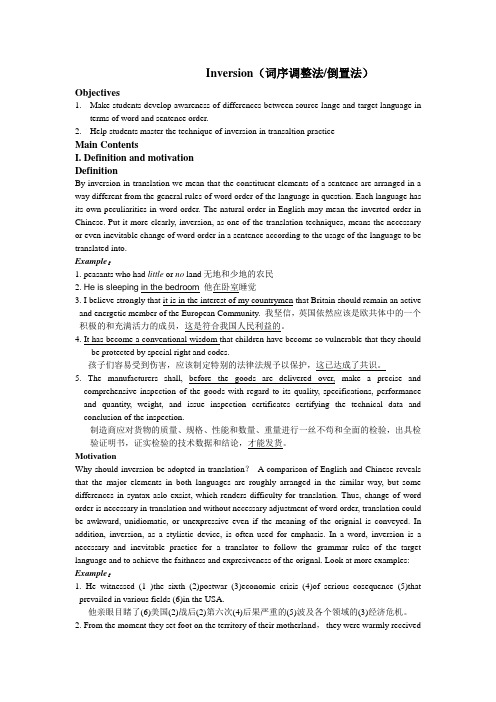
Inversion(词序调整法/倒置法)Objectives1.Make students develop awareness of differences between source lange and target language interms of word and sentence order.2.Help students master the technique of inversion in transaltion practiceMain ContentsI. Definition and motivationDefinitionBy inversion in translation we mean that the constituent elements of a sentence are arranged in a way different from the general rules of word order of the language in question. Each language has its own peculiarities in word order. The natural order in English may mean the inverted order in Chinese. Put it more clearly, inversion, as one of the translation techniques, means the necessary or even inevitable change of word order in a sentence according to the usage of the language to be translated into.Example:1. peasants who had little or no land无地和少地的农民2. He is sleeping in the bedroom 他在卧室睡觉3. I believe strongly that it is in the interest of my countrymen that Britain should remain an active and energetic member of the European Community. 我坚信,英国依然应该是欧共体中的一个积极的和充满活力的成员,这是符合我国人民利益的。
词序调整法

词序又称次序,指的是句子中各个词语或成分排列的先后顺序。
在很多情况下,无论是在英语还是汉语中,某个单词或短语在句子中的语法功能往往取决于它在句子所处的位置。
英汉对比研究表明,这两种语言中主要成分的词序大体一致,但也有一些不同之处。
给翻译带来困难的主要是英汉两种语言句子成分位置的差异。
差异最大的是定语和状语的位置。
在英汉翻译中,把原文的某种词序在译文中变换成另一种词序的方法叫做词序变换法或词序调整法。
下面着重探讨英汉翻译中需要调整词序的几种情况:宾语、定语、状语、插入语、英语的倒装结构以及并列成分。
一、宾语词序的调整一、宾语词序的调整在英汉两种语言中,动词宾语(包括直接宾语和间接宾语)可能出现在动词前面或动词后面。
在可能的情况下,应尽量保持原来的词序,但如果按原文词序翻译不通,或者译文不通畅,则应该考虑重新调整译文顺序。
调整顺序时,可能会有词语的增减。
We plan to locate our company’s headquarters in New Y ork.我们计划把公司总部定在纽约。
(2) Pour me a cup of tea, will you?给我倒杯茶,好吗?二、定语词序的调整(一)单词后置定语词序的调整一般来讲,英语中单个单词作定语放在被修饰的中心词之前,汉译时无须调整词序;但英语中有些单词作定语时,必须放在被修饰的中心词之后,构成后置定语。
这类后置定语译成汉语时,一般应置于所修饰的中心词之前。
This is the only reference book available here on the subject.这是这里惟一能找到的有关该题目的参考书。
(2) They are trying their best to get all the assistance possible.他们正竭尽全力争取得到一切可能得到的帮助。
1.英语中一些以-able或-ible结尾的形容词做定语时,要放在被修饰的中心词之后;而汉译时往往需要提前。
第八讲-词序调整法 PPT
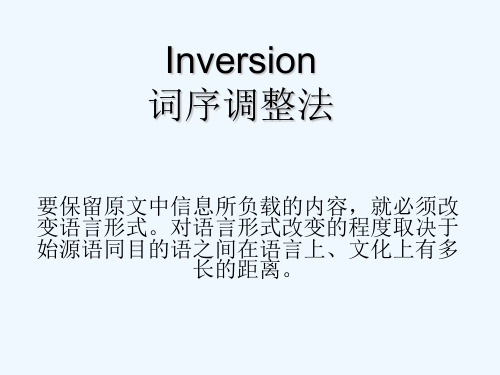
Translate the following sentences into English
They were very glad to have accepted the presents offered.
Keith: A little, yellow, ragged, lame, unshaven beggar.
凯斯是一个讨饭的,他身材矮小,面色苍黄, 衣衫褴褛,瘸腿,满脸胡子。
She was an intelligent, attractive and somewhat temperamental daughter of a well-to-do doctor in Haddington. (The New Encyclopedia Britannica)
2.短语作定语。 英语中,修饰名词的短语一般放在名词之后,
而汉语则反之,但间或也有放在后面的,视 汉语习惯而定。
their attempt to cross the river(后置) 他们渡江的企图(前置)
the decimal system of counting(后置) 十进制计算法(后置)
无地和少地的农民
Small and medium-sized enterprises
中小企业
a small round wooden table 一张木制小圆桌
a brave hard-working people 一个勤劳勇敢的民族
an outstanding contemporary American writer 一位美国现代优秀作家
4.2.短语作状语。 英语中短语状语可放在被修饰的动词之前或之后,译成 汉语时则大多数放在被修饰的动词之前,但也有放在后 面的。 Seeing this,some of us became very worried.(前置) 看到这种情况,我们有些人心里很着急。(前置) A jeep full sped fast,drenching me in spray.(后置) 一辆坐满人的吉普车急驶而过,溅了我一身水(后置)
调序法
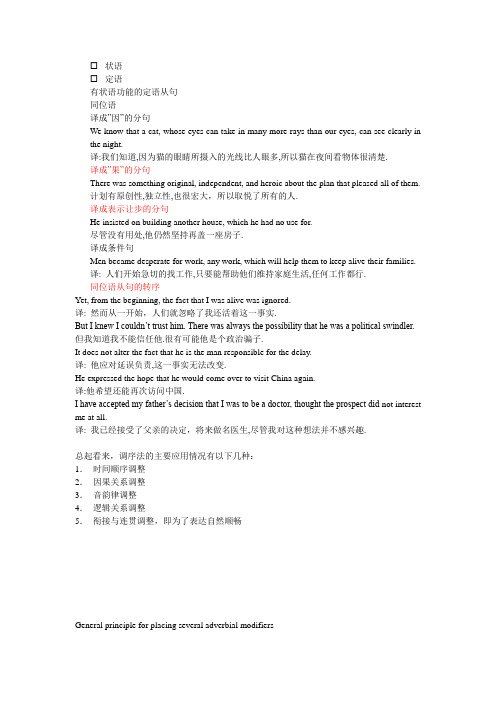
☐状语☐定语有状语功能的定语从句同位语译成”因”的分句We know that a cat, whose eyes can take in many more rays than our eyes, can see clearly in the night.译:我们知道,因为猫的眼睛所摄入的光线比人眼多,所以猫在夜间看物体很清楚.译成”果”的分句There was something original, independent, and heroic about the plan that pleased all of them.计划有原创性,独立性,也很宏大,所以取悦了所有的人.译成表示让步的分句He insisted on building another house, which he had no use for.尽管没有用处,他仍然坚持再盖一座房子.译成条件句Men became desperate for work, any work, which will help them to keep alive their families.译: 人们开始急切的找工作,只要能帮助他们维持家庭生活,任何工作都行.同位语从句的转序Yet, from the beginning, the fact that I was alive was ignored.译: 然而从一开始,人们就忽略了我还活着这一事实.But I knew I couldn’t trust him. There was always the possibility that he was a political swindler. 但我知道我不能信任他.很有可能他是个政治骗子.It does not alter the fact that he is the man responsible for the delay.译: 他应对延误负责,这一事实无法改变.He expressed the hope that he would come over to visit China again.译:他希望还能再次访问中国.I have accepted my father’s decision that I was to be a doctor, thought the prospect did not interest me at all.译: 我已经接受了父亲的决定,将来做名医生,尽管我对这种想法并不感兴趣.总起看来,调序法的主要应用情况有以下几种:1.时间顺序调整2.因果关系调整3.音韵律调整4.逻辑关系调整5.衔接与连贯调整,即为了表达自然顺畅General principle for placing several adverbial modifiersGeneral principle for placing several adverbial modifiersA common rule for the sentence arrangementA bus travels to the edge of the Masaya Craters in Nicaragua, an active volcano just 500 meters high.译文1:到尼加拉瓜的马萨亚火山口可以乘坐公共汽车。
- 1、下载文档前请自行甄别文档内容的完整性,平台不提供额外的编辑、内容补充、找答案等附加服务。
- 2、"仅部分预览"的文档,不可在线预览部分如存在完整性等问题,可反馈申请退款(可完整预览的文档不适用该条件!)。
- 3、如文档侵犯您的权益,请联系客服反馈,我们会尽快为您处理(人工客服工作时间:9:00-18:30)。
a great and most glorious cause 极其光荣伟大的事业
Generally speaking, especially in colloquial speech or literary works, a series of attributive modifiers in Chinese is seldom completely placed before a noun: with some before the noun, and the rest after.
汉语在语序上的表达习惯:
(1) 汉语一般状语在前,动词在后 (2) 汉语一般时间状语在先,地点状语在后 (3) 汉语重人称,人称主语在前,原物称主
语在后 (4) 汉语多主动语态,“真主语”在前,
“假主语”在后 (5) 汉语一般从句在前,主句在后 (6) 汉语中,定语或定语从句常置于被修饰
Keith: A little, yellow, ragged, lame, unshaven beggar.
凯斯是一个讨饭的,他身材矮小,面色苍黄, 衣衫褴褛,瘸腿,满脸胡子。
She was an intelligent, attractive and somewhat temperamental daughter of a well-to-do doctor in Haddington. (The New Encyclopedia Britannica)
Inversion 词序调整法
要保留原文中信息所负载的内容,就必须改 变语言形式。对语言形式改变的程度取决于 始源语同目的语之间在语言上、文化上有多
长的距离。
1. Definition and discussion 2.Inversion of word/phrase order 3. Position of attributive words, phrases, 4. Position of adverbial words, phrases 5.Inversion of sentence structure
1. Definition and discussion
By inversion in translation we mean that the constituent elements of a sentence are arranged in a way different from the general rules of word order of the language in question. Each language has its own peculiarities in word order. The natural order in English may mean the inverted order in Chinese. Put it more clearly, inversion, as one of the translation techniques, means the necessary or even inevitable change of word-order in a sentence according to the usage of the language to be translated into. This change of word order is necessary because, first of all, each language has its own natural word order and its own peculiarities in word order, secondly, inversion, as a stylistic device, is often used for emphasis.
大家应该也有点累了,稍作休息
大家有疑问的,可以询问和交流
loss and gain
得失
track and field (events)
田径运动
the iron and steel industry
钢铁工业
open-door policy
门户开放政策
peasants 的名词前
汉语在语序上的表达习惯:
(7) 汉语中,行为动作先发生的在前,后发 生的在后
(9) 汉语中,地点状语的语序是,大地方在 先,小地方在后
汉语重人称,人称主语在前,原物称主 语在后
A wave of cigar smoke accompanied him in.
他进门时带进来一缕雪茄烟雾。 Hunting is his latest enthusiasm. 他最近热衷于打猎。
无地和少地的农民
Small and medium-sized enterprises
中小企业
a small round wooden table 一张木制小圆桌
a brave hard-working people 一个勤劳勇敢的民族
an outstanding contemporary American writer 一位美国现代优秀作家
1. Inversion of Word Order in Translating Word-Groups or Phrases
The coordinating words of an English wordgroup or phrases are usually arranged according to their shades of meaning: “each is more impressive than the preceding” (Fowler 1965: 92). Chinese word order is often the opposite. Thus a common rule for translation is:
